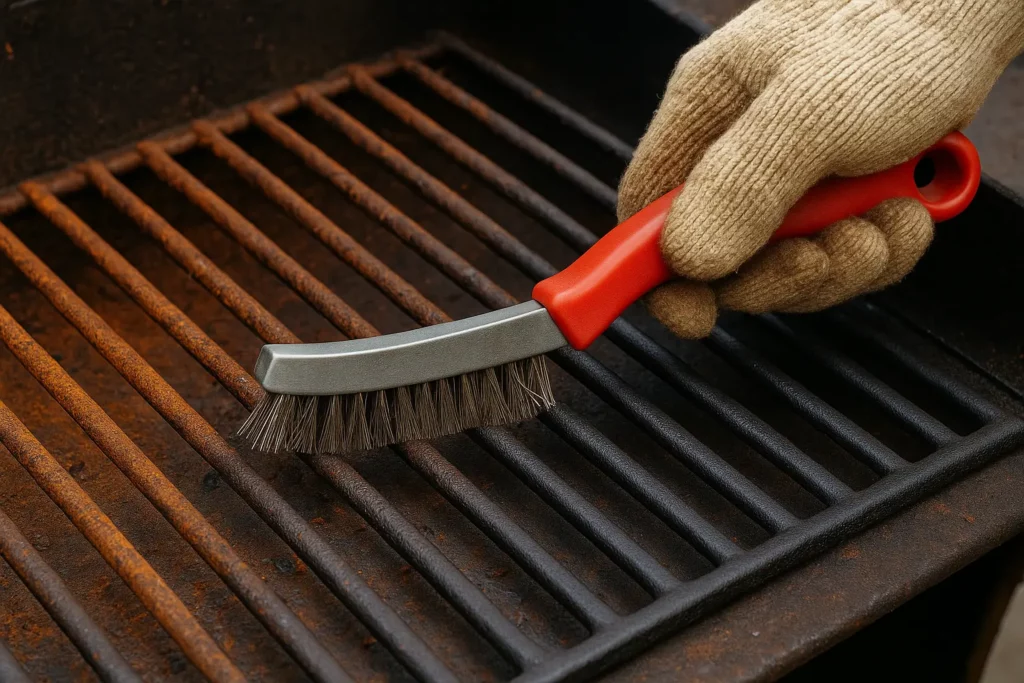This post may contain affiliate links. If you use these links to buy something we may earn a small commission. Thanks.
If you’re a barbecue lover, there’s nothing more disheartening than lifting the lid of your BBQ grill only to find rust covering the grates and interior. Rust not only affects the performance of your grill but can also pose health risks if not handled properly. Whether it’s from moisture, poor storage, or neglect, rust happens to the best of grills.
But don’t worry your rusty grill isn’t doomed. With a little effort, the right tools, and the tips in this guide, you can bring it back to life and keep it rust-free for the long haul.
Why Rust Happens and Why You Should Clean It
What Causes Rust on BBQ Grills?
Rust forms when iron or steel is exposed to oxygen and moisture over time. With grills constantly exposed to the elements, especially if stored outdoors, moisture, humidity, rain, and even salty air can start the rusting process.
Common rust causes:
- Leaving the grill uncovered
- Failing to clean after use
- Storing it in humid conditions
- Food residue or marinades with high salt content

Why You Must Clean Rust
- Health: Cooking on rusted grates can transfer flakes to your food.
- Performance: Rust can block gas burners or degrade heat distribution.
- Lifespan: Allowing rust to progress can destroy your grill.
Cleaning rust and maintaining your grill is key to keeping your BBQ experiences both safe and delicious.
Understanding Rust Types and Affected Areas
Before grabbing your cleaning tools, it’s important to inspect the type and severity of the rust.
Surface Rust vs. Deep Corrosion
- Surface Rust: Light and flaky rust that typically forms on grates and metal surfaces. Easy to clean.
- Deep Corrosion: Pitting or holes in the metal. May require part replacement.
Common Rust-Prone Parts
- Cooking grates
- Flame tamers or heat deflectors
- Burners
- Lid and hood (especially near the edges)
- Metal frame or legs
Preparing for Rust Removal: Tools and Safety First
Safety Tips
- Ensure the grill is cool and disconnected from any power or gas.
- Wear rubber gloves to protect your skin from cleaning agents or rust flakes.
- Work in a ventilated area—preferably outdoors.
Essential Tools and Supplies
- Wire grill brush or stainless-steel brush
- Steel wool or sandpaper (medium and fine grit)
- White vinegar
- Baking soda
- Dish soap
- A bucket of warm water
- Sponge and microfiber cloth
- Grill-safe oil (vegetable or canola)
- High-temperature grill paint (if restoring exterior)
Optional:
- Lemon juice
- Aluminum foil
- Rust remover spray (grill-safe)
Step-by-Step Guide to Cleaning Rusty Grill Grates
Grill grates take the most abuse and are usually the first to rust. Here’s how to tackle them:
Step 1: Remove and Inspect
Take the grates out and check both sides for rust. If rust is minimal, you’ll need only basic scrubbing. For heavier rust, a soak will help loosen it.
Step 2: Soak Grates in Vinegar and Baking Soda
- Mix 1 part white vinegar with 1 part water in a large container.
- Add a generous amount of baking soda to create a fizzing action.
- Submerge grates and let them soak 6–12 hours, or overnight for severe rust.
Step 3: Scrub the Grates
After soaking, use a wire brush, steel wool, or crumpled aluminum foil to scrub away the loosened rust.
- Apply more baking soda directly to stubborn areas.
- Scrub in circular motions for thorough cleaning.
Step 4: Rinse and Dry
- Rinse thoroughly with clean water.
- Dry with a clean cloth and let sit in the sun or air dry completely.
Step 5: Season the Grates
Rub a thin coat of high-heat cooking oil (like canola) on the grates. Heat the grill to high for 15 minutes to allow the oil to polymerize, creating a protective, non-stick surface.
Cleaning Rust from Interior and Exterior Grill Surfaces
Interior Surfaces
- Remove debris: Use a shop vac or brush to clear ash and debris.
- Scrub the firebox and burners with soapy water and a wire brush.
- For rust on burners or flame tamers, gently scrub and inspect for holes or cracks.
Exterior Surfaces
Grill exteriors are often painted steel or stainless steel.
- Use a sponge and dish soap to clean the outside.
- For rust spots, make a paste with baking soda and water or lemon juice. Let sit on the rust for 10–15 minutes before scrubbing.
- Avoid abrasive tools on painted or stainless surfaces—use a nylon scrubber instead.
Optional: Use Grill Paint
If the grill’s exterior is heavily rusted or the paint is flaking:
- Sand the affected area to smooth it.
- Wipe clean and apply high-temperature grill paint rated for 600°F or more.
When to Replace Rusty Grill Parts
Sometimes, rust damage goes beyond simple cleaning.
Signs It’s Time to Replace Parts
- Grates have deep pits or holes
- Burners have rusted through or are leaking gas
- Flame tamers are falling apart
- Structural parts are breaking or collapsing
Replacement Options
- Universal or brand-specific grill grates
- Replacement burners and shields
- Aftermarket grill parts (check compatibility with your model)
Don’t wait too long—compromised parts can lead to unsafe grilling conditions.
Tips to Prevent Future Rust
Once you’ve restored your grill, don’t let it fall back into a rust trap. Follow these maintenance habits to keep rust away for good.
1. Always Clean After Use
- Burn off residue and brush grates while still warm.
- Empty ash from charcoal grills to prevent moisture build-up.
2. Season the Grates Regularly
- After every few uses, coat with oil and heat to high for 10–15 minutes.
3. Use a Quality Grill Cover
- Choose a weather-resistant cover that fits snugly.
- Always cover your grill when not in use—even on covered patios.
4. Store in a Dry Location
- If possible, move your grill to a shed or garage during rainy seasons or winter.
5. Avoid Harsh Cleaners
- Stick with gentle soaps or natural cleaners to avoid damaging finishes.
Natural and Eco-Friendly Rust Cleaning Alternatives
Chemical rust removers are effective, but there are natural, safer alternatives too.
1. Vinegar and Baking Soda
- Acidity from vinegar loosens rust, and baking soda helps scrub it off.
2. Lemon Juice and Salt Paste
- Mix lemon juice with coarse salt and apply to rusty spots.
- Let it sit for 30 minutes and scrub off.
3. Potato and Dish Soap
- Cut a potato in half, dip it in dish soap, and scrub the rusted surface.
- Oxalic acid in potatoes reacts with the rust and helps remove it.
Pros and Cons
| Natural Cleaners | Chemical Cleaners |
|---|---|
| Safe and non-toxic | Often faster and more powerful |
| Budget-friendly | May contain harsh substances |
| Eco-conscious | Risk to pets and children |
Final Tips and Troubleshooting
Rust Keeps Returning?
- Moisture might still be present—check for grill leaks or improper storage.
- Re-season your grates more frequently.
- Avoid leaving food or sauces on the grates.
Grill Has Large Rust Holes?
- Evaluate the cost of repairs vs. replacement.
- Deep corrosion usually means it’s time for a new grill.
Tips from BBQ Enthusiasts
- “After every cook, I coat my grates with oil while they’re still warm it keeps rust away completely.”
- “Store your grill inside during the off-season. You’ll save yourself from a springtime rust cleanup every year.”
Conclusion
A rusty BBQ grill isn’t a lost cause it’s just calling out for some care. With a bit of time, some elbow grease, and the right tools, you can bring even the most neglected grill back to life. By learning how to clean rusty BBQ grills and adopting a few easy maintenance habits, you’ll protect your investment, keep your food safe, and enjoy delicious, rust-free grilling for seasons to come.
